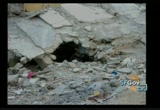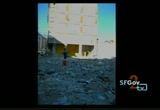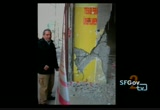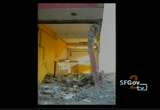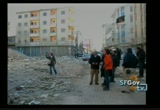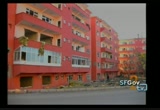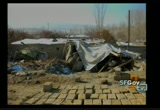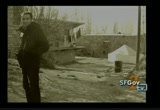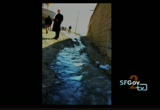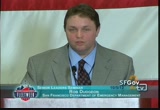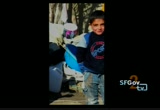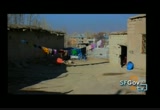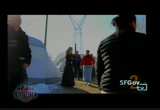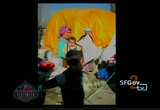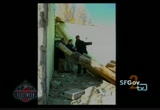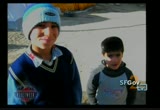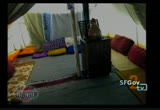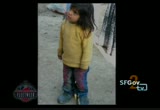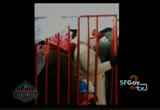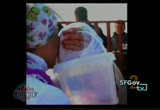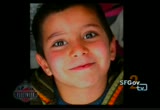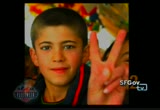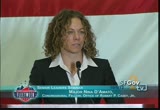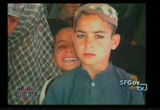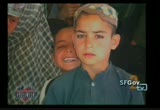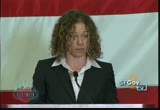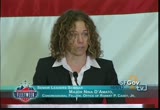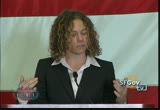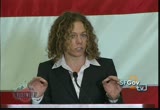tv [untitled] November 28, 2012 1:00am-1:30am PST
1:00 am
with halloween so it's two cresendo events. last halloween diana who you see running around here, key to the organization, who does most of the logistics to make this happen, and i went to get dinner at a local establishment. it's called hays and kabob and we went to get dinner on our way to the operations center hoping nobody would celebrate too much so we could get out of there at a decent hour. when we went there, we were both in our black eem polos and
1:01 am
we started talking to the owner and he said, oh, did you hear about the earthquake in turkey? well, we'd heard about it the way everybody heard about it, i think it got about two minutes on some of the cable news channels, and that was it. there wasn't a lot of coverage on the van earthquake. it just didn't hit the air waves that much. he said, oh, my family's there. and he started talking about the devastation and exactly what the impact was. they were friends with the mayor of van and the mayor had asked them because they were in san francisco if there was a way they could get san francisco to help them and he was trying to get a meeting with the mayor to express this concern and make a request. i said, well, interestingly enough, we could probably help you with that because we do have a bit of a connection with the mayor's office. but the first thing we need, we need a letter, we need something official. i mean, i'm just an
1:02 am
old paramedic, i have to ask, right? within 24 hours we had a letter. and this was the first hint of what we were going to see when we got there about the resolve and the resiliencke of these people. technology obviously was impacted so in order to get us a letter in the quickest amount of time possible, they typed it on an old typewriter, took a picture of it and emailed us the jpeg. no scaner, nothing like that, it was a jpeg of a leg. i said, good enough, it's a letter. we took that to ann kronenberg and said here we are, what can we do. in the meantime we did some brain storms, is this something real, is there any value we can add to this scenario? what we came up with was obviously we don't have the
1:03 am
deep pockets to send over rebuilding teams or send over thousands and thousands of tons of material, that's just not what we could do. but what we could do is assemble a small team to go on a mission to van and meet them and talk to them and find out more about what do they need and is there an intersection of what we can do for them and in the meantime it gives us an opportunity to really look and see what the situation was and what we can take away from it. so that led to the next question, which all of us in government understand this one really, really well, how do we pay for it? last time i checked, home land security grants and general fund don't really look fondly on missions to foreign countries because we do have a department of state and a military that does this all the time. so is it really something that's in our purview and what can we use the funding for and that led to the next obvious conclusion in our minds, which was we need a partner. we need a nonprofit
1:04 am
partner. and the first thing that popped in our mind was fleet week because we've been working with fleet week for a number of years and the focus has been on humanitarian relief. so we made a phone call and we talked to lewis. and i gotta say, if there's one guy in this room that is the unsung hero of fleet week, it's lewis. he doesn't get a lot of recognition but he spends 16 hours a day this time of year working on fleet week and we went to him (applause) -- when we went to him with this admittedly somewhat crazy idea, we said, we want to partner with you and by that i mean i want you it raise some money. and he didn't even blink. he said, well, how much do you need and we calculated it out. really in the world of
1:05 am
corporate america, not that much. in the world of government, even less. and he said, yeah, we can do that. let me make some phone calls. a couple of days later, he said, all right, i got a couple commitments. let's put a team together. it was myself, diana, lewis, val valesky, i'm sorry, it's been a long week already and some people from public works. we want a couple engineers, i'm an old medic, diana is really the logistics master and i figure if we're going to go someplace where thins might go awry, i wanted someone like that. so we put this together in 30 days, including a holiday. we were wheels up for van, we spent 10 days in country. and the story there is interesting, to say the least. a little bit of a cultural
1:06 am
difference. you kind of have to wade through, and i'm sure i'm preaching to the choir in the military here, you have to separate out how things are versus what you're used to and what it really means because otherwise you can really get into apples and oranges. so the take away for me, and what should be rolling behind me, are just a series of photographs of van when we were there. and what i hope the story that they are telling is this example of what we saw. i mean, there's some classic examples if you look at the buildings, these were all new buildings, by the way, that were condemned. but as you look you'll see some buildings with big cracks in them to where they are x-like cracks. that's classic soft story construction damage. that's what happens when earthquake sheer hits. that's what it looks like. for an emergency manager in san francisco, that's a really valuable lesson. i know what that looks like now. flood and val were
1:07 am
great in taking engineering principles and helping us understand what was at work here and at the end of the line i'd say the first lesson that i'm going to say we took away was that building codes matter. they matter a whole bunch. because what we saw was maybe lax not forcement of building codes. they have building codes, they just didn't enforce them as much. using fill brick was great installation but not so great during shaking. so all these buildings were damaged and unstable and people were afraid. which takes me to the people. because i've met a lot of people in my life. i've dealt with people, the very rich and the very poor. as a paramedic, you only see people when they are having a really bad day. that's what one of my mentors explained to me early on. no
1:08 am
matter what you think when you walk in the door, remember it's the worst day they've had in a while, whether or not it's your day or not. and there's something to be said for that. so the story of the van people. first of all, i have to get a little bit of politics here. it's a heavily kurdish region. this is eastern turkey. van is the largest settlement in eastern turkey. at that time its peak it had about 700,000 people in it during the summer. beautiful like, absolutely gorgeous place to be. after the earthquake everybody who could leave, did. so what you have left are those that are either die-hards, the people that are the leaders of the community that want to rebuild, or people that couldn't leave. and that's really telling because when you look at these pictures you're going to see abdomen abject poverty. that's not really
1:09 am
what it was before the earthquake so it went from bad to worse for these people. but what you saw time and time again is they were out and rebuilding and carrying on and i think that says a lot about people in general and that's the next take away, is that no matter if you look at van turkey, you go to china, you go to india or you go to the united states, go up to the dakotas, you go to missouri, you go to joplin, what you find is that people are more resilient than we give them credit for being. people will will come out in their community and help themselves given the opportunity. now, again, back to the politics. being a heavily kurdish region, they don't have the greatest relationship with istanbul, they don't have the greatest relationship with the turkish government. it's a completely different world.
1:10 am
it's completely opposite. when their armed forces show up, it's not really lacked upon as a good thin. this is why i want to say thank you to our military that's here today, to the army, the navy, the military in general, the marines, the coast guard, even i saw a couple air force running around here yesterday. the fact that you are here and you are in san francisco and you do this every year, it says a lot. because we lack at -- look at this as a good week. we have a great working relationship and after being there and seeing that it's not a good relationship and people get really, really tense when the guys in green show up, it makes me appreciate what we have all the more. there's one other thing i really appreciate, by the way, and i'll direct this to general speese being the trainer that he is, i got a whole new appreciation for muzzle
1:11 am
discipline back there. i appreciate the fact that we drill that into our personnel that don't point anything you don't want to shoot at. because there's one point i was actually in our little van behind a truckload of soldiers and there were a lot of automatic weapons, everybody with fingers on the triggers and muzzles going everywhere and i'm, look, can we just back off a little bit? let's not tailgate quite so much, please. i know you guys know that but it was a real eye opener for an old medic like me. people are resilient. they come out of the rubble, they are living in tents, they are afraid to go in their houses and it's not getting better. this is december, we're coming on winter. it's getting cold. and it gets really cold there. it's high mountainous region. and we're wondering what are they going to do? we're talking to local government and because of the politics there's
1:12 am
a huge disconnect. the central government, the governor, works for the turkish government, obviously it's a turk. the local municipality is elected, he's kurdish. you think we got issues. i'm sorry, this is not republican and democrat politics, this is we don't like you, we're going to put you in jail. by the way, they did that a few months ago. they rounded up a bunch of local mayors and put them in jail. if people went to the local camps they had resources but they were also afraid. true or not, i don't know, i didn't validate the information but there were reports of assaults and abuse by the soldiers in these camps. i don't know if it's true or not, i can't comment on that, i'm just telling you what i heard from mue kurdish partners there.
1:13 am
whether it's true or not is irrelevant because people won't go to the camps. in the meantime, the government says we won't support you if you're not in the camps. they won't do points of distribution, they don't even want you to have tents and that's why you see the rag tag asortment of red crescent tents and there's some shelter box tents that were out there and people just made their own shelters. so we had this huge thing where we have the local municipality who is trying to support their population in whatever way they can, but they are running out of resources. it's december, it's cold, they are wondering what they're going to do. so the next lesson i took away from this is when you're looking at recovery, you have to be seamless. that's the take away here. now obviously we're not at war with any part of our population. we might yell at each other, we might have debates, we might have some civil protests and what not but at the end of the day we're all americans and we all come together.
1:14 am
there, not so much. so the take away here is we got to be seamless, which redoubled my belief in our recovery planning. we have to be able to do this quickly. we have to support people where they are. we have to have shelter in place. we have to be able to distribute what people need and we have to partner with the community to make that happen and that's what we've been working on. that's one of the biggest takeaways there. now about first responders. i come from this world and we have our rivalries. fire and police, big red and big blue, being the paramedic i'm like the pesky little brother that just showed up not too many years ago. you hear stories, so and so locked so and so out of a command post in such and such city. so and so argued about who got what raise last year.
1:15 am
here, a little bit different. here, medical resources and law enforcement are owned by the governor which, as established, comes from the turkish government. fire fighters and things like public works are owned by the municipality. let me tell you about budget discrepancies. the fire department, i got to tell you, when i went and i met with the fire chief, that one left a mark. their fire department was red tagged but they didn't have a place because it was so cold to house their engines because you can't leave diesel engines out in the cold, just doesn't work too well, so they still had to use the facility but they housed the personnel in two tents out in front. their headquarters is one tent and their dorm is another tent and they welcomed us in there, didn't even think twice. and in the story of what it was like there, for a community
1:16 am
of nearly 700,000 people, their complete complement of fire fighters that were on duty, their professional staff, was just over 40. they had 4 pieces of apparatus. the newest of which was over 10 years old. they kept it together literally with duct tape and baling wire and that's what they did every day. and i asked them, how was it after the earthquake. and he said, well, you know, most of them lost their homes too. nobody here was untouched. they all lost family in the rubble, they all lost their homes, but they all came to work. every one of them went out and worked every day until they got as many people recovered as possible and even then most of them just moved into the fire station because they didn't have anywhere else to go. and even then it didn't stop because now you have people living in tents. their heating
1:17 am
is open flames. every night they were out fighting tent fires so people that were already displaced and already without just gt a little worse. yet they kept doing it. i asked him, i said, what do you guys need? what can i do? what can we do as a city, as a community, what can we do to help you? and the answer was, you know, we really need equipment. i said, all right, well, i can see what i can do, there's a couple networks. and what we really would like is a way to help the community because as you've heard mentioned here a few times, this idea of post traumatic stress, it was prevalent. you can feel it. people were -- this was a month or so, two months after. every time there was an aftershock people were on edge. we were on edge, for crying out loud. we're wandering around under this rubble, i'm looking back at these pictures now and thinking, what am i, an idiot?
1:18 am
these buildings are going to come down. if you look at these pictures commerce is taking place under it where in america they would close down the block. this where my family has always had its stall. we got to make a living. what else can we do? we don't have any medical training which kind of -- okay, you are fire fighters, i figured you had some. that was my naivete at the moment, i think i was a little overwhelmed myself. that's still my on-going project as far as that goes, how can we raise some funds and i actually have a bunch of paramedics that would go over there in a heartbeat on their time if we could find a way to fund it to teach them the medicine. the reality is they don't have a health care system now. it's slowly coming back but it was
1:19 am
wiped out. they had the tertiary care facility in the region. they were the closest thing to a trauma center. they were the closest thing to intensive care. when we were there, the nearest surgery was 400 kilometers away and they don't have helicopters, not so much. there's a few owned by the military. so it was a long ride. as a matter of fact, we thought about that as we were stopped on a highway and people were barreling at us, i thought, wow, 400 kilometers is a long way if something goes wrong here. but it puts it all in perspective. their health care was wiped out and they don't have the resources. that's something we would still like to do. the real lesson here is people are way more resilient than we give them credit for. it didn't get better, it got worse. yet they carried on. that's what i take inspiration
1:20 am
from. you look at these pictures, you look at the people, you look at the children, a couple pictures of the inside of the tent, it was spotless. if you look at the children they are not filthy by any stretch. there are no bugs. i'm a paramedic, i've been bugs. there are no bugs. my lesson is how do i set things up, how do i bring this back and how does our department, how does our city, how does every single one of us that has a word to say about this help our community set it up to where they will be that resilient? because what we've seen here is we plan for 7.9 or we plan for 7.5, it's often times more than that and there's always complications. look at japan. who knew? we plan for one thing and then you
1:21 am
have the cascading effect. we've talked a lot about the secondary and tertiary effects of disaster. it makes it more complicated but at the end of the day we have to be more resilient. so that's the take away. every single one of us, whether you are a nurse, in the fire department, dod or emergency management to help make our system a little bit more resilient, a little bit better. i have a laundry list of ideas if anybody wants to come help, i tell you. but there we are. what we've done since we've been back because i really wanted to do something productive, lewis has been such a great partner, we carried that partnership on. we've gone, we've truly taken, gone around the bend here and gone from talk to action with this partnership. one of the things, one of the few things we really could do was help to be a pipeline to supplies because like i said, they were running low on some things. their feeding centers were starting to shut down, they were running out of dry goods.
1:22 am
so we set up, anybody who is familiar with what's called aid matrix, it's essentially the craig's list of donations. you have to have a sponsor and you have to set up a portal and there's some costs associated with that and we set up an aid matrix for van, turkey. we've been able to arrange for some supplies to get there. not near as much as i would like, but one of the big challenges is transportation. it takes a few extra days to get there and there's really no trucks to do it. we are going to go back, maybe this time in the summer rather than the winter. we keep in touch with what's happening there and we keep the portal there and we keep pushing. in the meantime we keep learning and we keep pushing and we never stop thinking about them.
1:23 am
i think i'm going to end with that. thank you to the military and thank you to lewis. (applause). >> thank you, rob. next up will be nita demato, she has a fascinating story. >> before i begin, i'm very happy i don't have to talk to you about my current position, which is with the 112th congress of the united states. i'm very pleased to talk to you about my year in afghanistan. i'd like to thank the san francisco fleet week association, lewis loeven, specifically, major general myat, always a mentor, former secretary of state schultz and mrs. schultz, mrs. perry, honored to be in your presence. the uss makin island, chief of
1:24 am
the fairest city in the world, san francisco, and he esteemed professionals. this is nice, i'm going to move south of here and take you to afghanistan. as you know we have marines, soldiers, sailors in afghanistan currently, but i'm going to bring you to when i was there during 2010 and 2011 after the president decided to surge the forces. first marine decision, first marine expeditionary force forward entered southwest afghanistan during 2009. we arrived in 2010 so it was a bit more stable. and we went straight to helman and nimruz province. very complex dynamic environment that we were
1:25 am
operating in but before i begin it talk to you about the operational picture, i just want to give you a snapshot of afghanistan. when we got there i want to set the frame here so you understand what we're dealing with. afghanistan ranged 180th out of 1 86 on the world bank list of developed countries. 20 percent of the babies won't reach their first year of life. there is a 44 year life span for your average citizen. it has a less than 20 percent literacy rate and girls in afghanistan will marry by the time they are 15 and will likely birth their second child by the time they are 20. so this is the long-term effects of violence and civil wars within a failed state by every measure. the marines who are currently still in southwest afghanistan, they are
1:26 am
surrounded by very conservative culture. in 2010, this is not true now but narco trafficking and helman province alone was the fourth largest trafficker of heroin in the world. the taliban controlled the region and this is the environment that the marines came into in 2009 and subsequently it has stabilized significantly since then. so the primary mission of marines in southwest afghanistan is security. but our secondary mission is to assist our interagency partners in kick starting institutions that contribute to a stable nation state. as an educator i joined the team to oversee the portfolio of education and was given the opportunity to implement the country's education strategic plan over
1:27 am
the southwest provinces. additionally i was given the national action plan for women and control of two female engagement teams which were marines trained to interact with the population of women because of the pashi culture, the males were not allowed to interact with the women. in order obviously to ensure communities stay strong you have to not only address the men, but you absolutely need to address the women. so we created the female engagement team. with our interagency partners, the u.s. department of state, danish and british governments and of course the afghans, additionally we reached out to the private sector for partnerships, and not for profits to deliver things that we weren't capable of delivering or to cover gaps that arose as we implemented the plan. we implemented the plan
1:28 am
through 17 teams through helman and our two female engagement teams. this is actually just scrolling pictures. sometimes a picture says a thousand words and i don't want to take you down the whole history of a year but i wanted to talk to you about how we framed this plan. this plan was framed into 5 pillars and the 5 pillars were students and parents, we attempted to build buy in and assure safety among the students. there was lots of fear of reprisals. by sending your kids to school there was fear that the taliban was going to knock on your door and let you know that that wasn't allowed. previously the taliban had instituted a medrossas so their only forms of education were religious schools and those are religious schools for boys. teachers. there is no
1:29 am
teaching force in afghanistan so one focus was building that teaching force for the future and for students. can urriculum, this is sanitizing can urriculum that existing and distributing new can urriculum paid for by the japanese government. now, i say sanitized, the can urriculum that the marines walked into was soviet era can urriculum. what the soviets had done, and if you want to change a community or you want to change a country, you focus on the education system. and this was indicative in the can urriculum. you would see ak 47's and it would go through the whole nomenclature of ak 47's and it was k through 3 can urriculum.
111 Views
IN COLLECTIONS
SFGTV2: San Francisco Government Television Television Archive
Television Archive  Television Archive News Search Service
Television Archive News Search Service 
Uploaded by TV Archive on

 Live Music Archive
Live Music Archive Librivox Free Audio
Librivox Free Audio Metropolitan Museum
Metropolitan Museum Cleveland Museum of Art
Cleveland Museum of Art Internet Arcade
Internet Arcade Console Living Room
Console Living Room Books to Borrow
Books to Borrow Open Library
Open Library TV News
TV News Understanding 9/11
Understanding 9/11